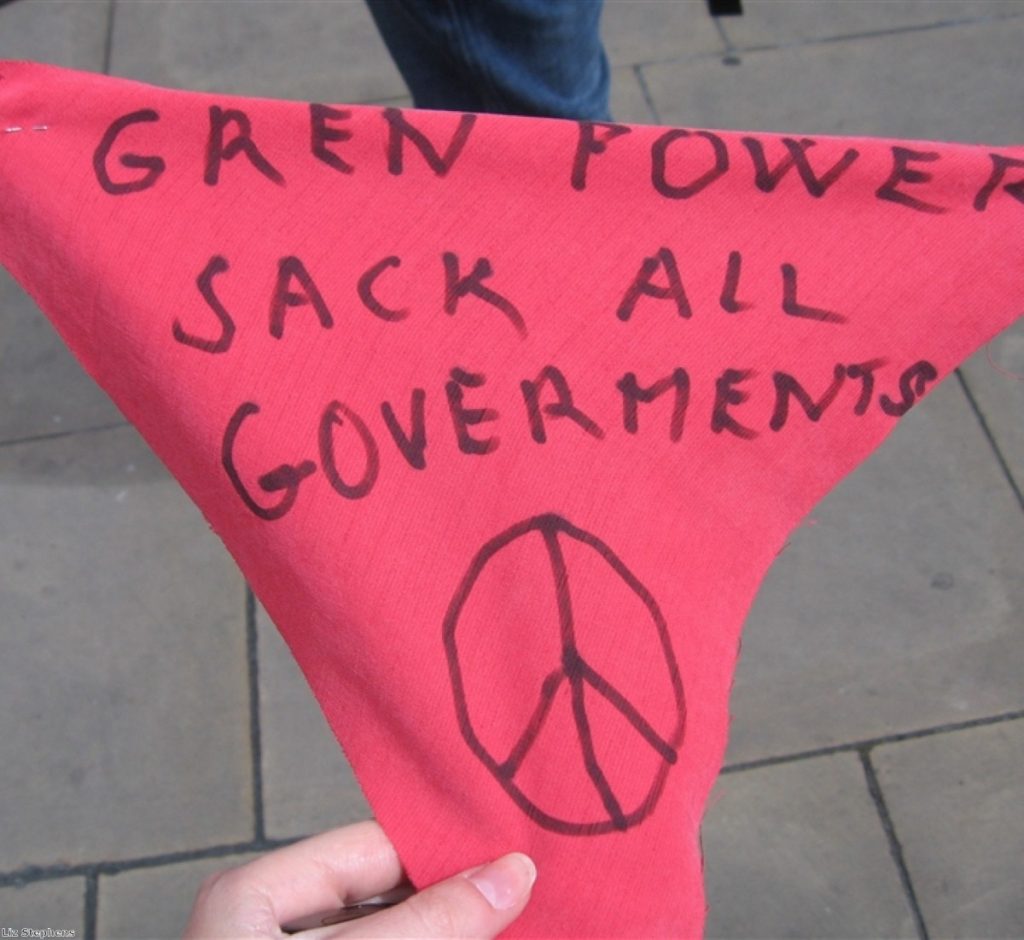Climate Camp hits London
By Ian Dunt and Liz Stephens
Climate Camp has descended on London today, with activists establishing their protest on Blackheath – the scene of the Peasants’ Revolt.
Police spent the week urging protestors to tell them where the camp would be based, but Climate Camp organisers would only divulge the fact it was within the M25.
Protesters gathered at noon in six locations around the capital.


Those locations were Waterloo Bridge, outside BP’s head office in St James’s Square, the Bank of England (where Ian Tomlinson died during April’s G20 protests), Stratford tube station, near to the site of the 2012 Olympics, outside the offices of mining giant Rio Tinto in Moorgate and Stockwell tube station (where Jean Charles de Menezes was shot dead by police in 2005).
Around midday, groups in West London had begun to move towards Trafalgar Square, while those in the east remained put, leading many commentators to speculate that the final location would be somewhere in east London.

Protesters based in Bank and Moorgate played ‘activist bingo’ and made home-made banners as curious City workers looked on.
An hour later, texts revealed the secret camp location as Greenwich Park and many protesters boarded the Dockland Light Railway (DLR) heading towards Cutty Sark.
So far, a festive and peaceful atmosphere has prevailed with the Metropolitan police using “community” policing, in stark contrast to the G20 protests in April.
“We are not expecting any violence or trouble unless it’s caused by the police,” Kevin Smith, a Climate Camp organiser, told politics.co.uk.
Protestor Ed Thompson gives his views on the Climate Camp demo:
Climate Camp have repeatedly asked the police to stay away from the camp.
In a letter to chief superintendent Thomas, the group wrote: “While most visitors to previous Camps have had an inspiring and positive experience, some of us have had to suffer violence, intimidation, theft, sleep deprivation and harassment, thanks to past examples of ‘pre-planned and proportionate policing operations’.
“I’m afraid we just don’t trust the police. Why? Because it seems as though every time we have a protest, the police turn up and start hitting people. Look what happened at the G20.”

The Met police have faced intense scrutiny of their plans for the camp, which will last until September 3rd.
The force are allegedly trialling a new ‘softer’ approach to the policing of the camp – known as ‘Operation Bentham’ – and have replaced Bob Broadhurst, who led the G20 operation, with chief superintendant Ian Thomas and superintendent Julia Pendry – who led the understated and widely-praised policing of the Tamil protests in Parliament Square.
The Met are also trialling the use of new media in an effort to communicate with protesters and have set up a Twitter profile to deliver updates to the camp. However, many protesters have expressed suspicion of these actions.
Jenny Jones, the Green party home affairs spokesman, who spearheaded attempts to make the police answer for their tactics during the G20, issued a warning to the Met today.
“Anyone who cares about civil liberties will understand how important peaceful gatherings and protests are, and how increasingly difficult the police have made it. So we will be judging the police’s behaviour at the Climate Camp,” she said.
“Much has been promised by the Met, in terms of a softly softly approach, which includes giving the camp their own safer neighbourhood team, but now they have to live up to those promises, and hopefully regain some of the respect they’ve lost recently.”

A Christian Aid poll released yesterday showed huge levels of support for as crack-down on tough policing of demonstrations.
Climate Camp organiser Kevin Smith explains his goals:
Ninety-three per cent think everyone in the UK should have the right to peaceful protest, while 50 per cent think the police are too heavy handed or deploy too many officers when dealing with protests.
Thirty-three per cent of respondents thought the police filming protesters is an invasion of privacy while 18 per cent were put off protesting in the future due to heavy handed policing.
Paul Brannen, head of campaigns at Christian Aid said: “Campaigning on issues such as climate change and how it affects the poor is a vital part of Christian Aid’s work.
“It is very important we give people the opportunity to protest peacefully about issues that matter to them and help the public to hold the government to account.

“It’s worrying that recent incidents involving the police at peaceful protests have made members of the public think twice about taking part in future peaceful demonstrations.”
The Camp for Climate Action was established three years ago to protest against the Drax coal-fired station in Yorkshire.












